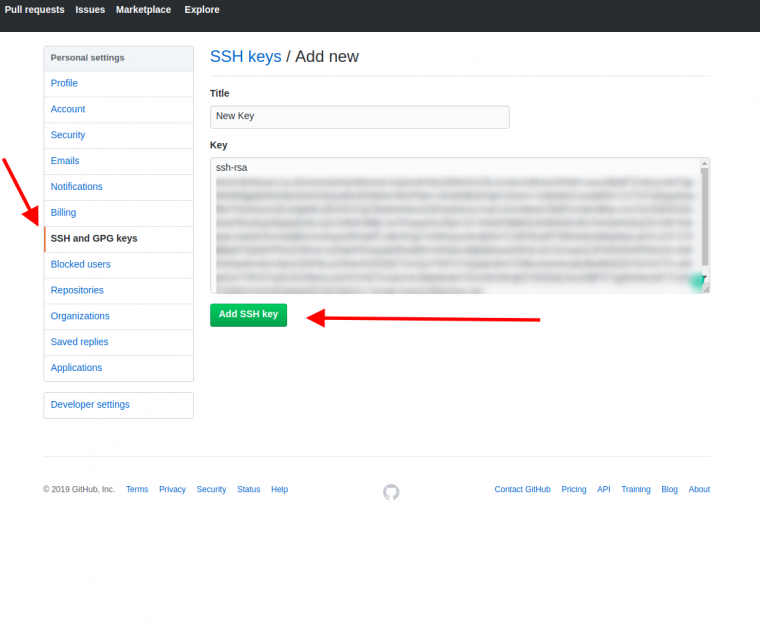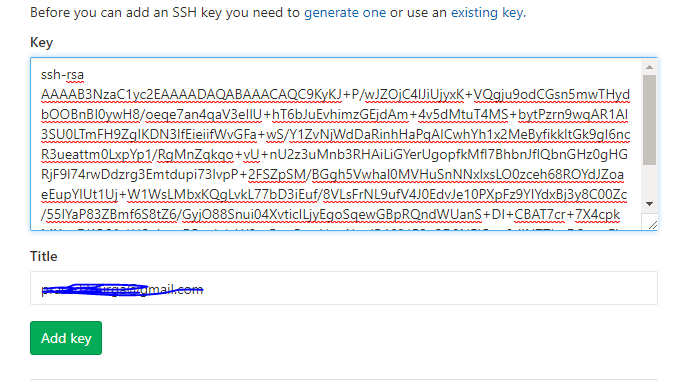Jul 09, 2018 How to Add an SSH Public Key to GitHub from Ubuntu 18.04 LTS July 9, 2018 “How to Add an SSH Public Key to GitHub from an Ubuntu 18.04 LTS System” covers the entire process of creating an SSH key pair on an Ubuntu 18.04 LTS system and adding the public key to GitHub.
This template allows you to create a Linux Virtual Machine with SSH Keys. This template also deploys Virtual Network with an inbound rule allowing only port 22 connections, Public IP addresses, a Public domain namespace, and a Network Interface.
The SSH rsa public key is typically generated by ssh-keygen, among other tools, on Linux, Mac, or Windows. If you already have an ~/.ssh/id_rsa.pub file, that will work directly, as you would expect. When deployed using the Azure portal, you should paste in the contents of your ssh-rsa public key file as a string. When you deploy the template from the Azure CLI, when the parameter prompts you for the string, do not surround it in quotes, or they will be treated as part of the public key.
For more information about SSH keys, see:
Github Create Public Ssh Key
If you are new to Azure virtual machines, see:
- Azure Virtual Machines.
If you are new to the template deployment, see:
Objectives
- Explain what an SSH key is
- Generate your own SSH key pair
- Add your SSH key to your GitHub account
- Learn how to use your SSH key in your GitHub workflow
Why Use an SSH Key?
When working with a GitHub repository, you'll often need to identify yourself to GitHub using your username and password. An SSH key is an alternate way to identify yourself that doesn't require you to enter you username and password every time.
SSH keys come in pairs, a public key that gets shared with services like GitHub, and a private key that is stored only on your computer. If the keys match, you're granted access.
The cryptography behind SSH keys ensures that no one can reverse engineer your private key from the public one.
Generating an SSH key pair
The first step in using SSH authorization with GitHub is to generate your own key pair.
You might already have an SSH key pair on your machine. You can check to see if one exists by moving to your .ssh directory and listing the contents.
If you see id_rsa.pub, you already have a key pair and don't need to create a new one.
If you don't see id_rsa.pub, use the following command to generate a new key pair. Make sure to replace your@email.com with your own email address.
(The -o option was added in 2014; if this command fails for you, just remove the -o and try again)
When asked where to save the new key, hit enter to accept the default location.
You will then be asked to provide an optional passphrase. This can be used to make your key even more secure, but for this lesson you can skip it by hitting enter twice.
When the key generation is complete, you should see the following confirmation:
The random art image is an alternate way to match keys but we won't be needing this.
Add your public key to GitHub
We now need to tell GitHub about your public key. Display the contents of your new public key file with cat:
The output should look something like this:
Copy the contents of the output to your clipboard.
Login to github.com and bring up your account settings by clicking the tools icon.
Select SSH Keys from the side menu, then click the Add SSH key button.
Name your key something whatever you like, and paste the contents of your clipboard into the Key text box.
Github Generate Public Ssh Key Manager
Finally, hit Add key to save. Enter your github password if prompted.
####Using Your SSH Key

Going forward, you can use the SSH clone URL when copying a repo to your local machine.
This will allow you to bypass entering your username and password for future GitHub commands.

Generate Ssh Key Github Windows
Key Points
- SSH is a secure alternative to username/password authorization
- SSH keys are generated in public / private pairs. Your public key can be shared with others. The private keys stays on your machine only.
- You can authorize with GitHub through SSH by sharing your public key with GitHub.